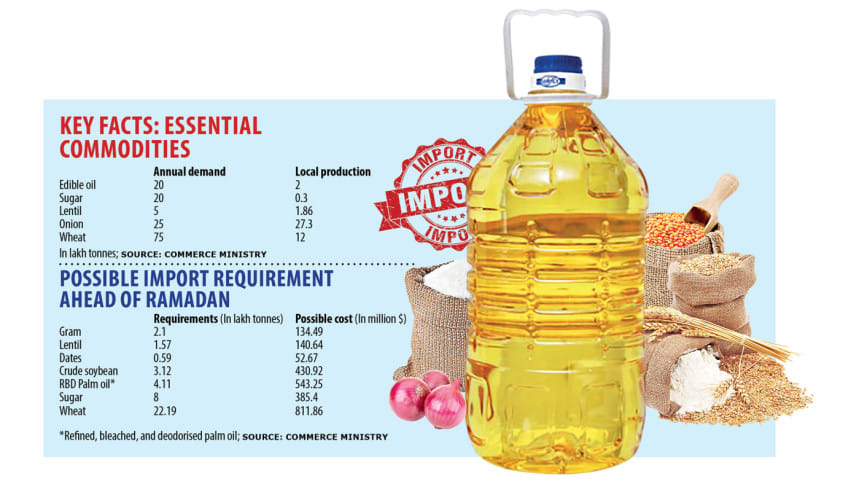BB relaxes LC requirements for Ramadan commodities

The central bank has asked banks to take a minimum cash advance from importers while opening letters of credit (LCs) for essential commodities as it looks to keep their prices at a tolerable level during Ramadan and ensure smooth supply.
The advance payment, also known as the cash LC margin, should be kept at the minimum level depending on the bank-client relationship, said the Bangladesh Bank in a notice yesterday.
The directive comes a week after the commerce ministry suggested the central bank form a crisis management cell to facilitate the opening of LCs for essential commodities imported in the run-up to Ramadan when the demand for a number of basic items surges.
Importers of eight items – edible oil, gram, lentil, onion, sugar, peas, spices and dates – will be extended the import facility with a minimum LC margin.
The demand for essential products usually goes up during the fasting month, driving up their prices on most occasions.
The prices of edible oil and sugar have already surged in Bangladesh because of the higher import costs of the raw materials needed to produce them, the escalated transport and fuel costs, and the energy shortage, driven mostly by the Russia-Ukraine war.
Businesses, including commodity importers and processors, have complained that they can't open LCs to buy essential commodities from the external market since banks are largely reluctant to facilitate their purchase amid the US dollar shortage.
Bangladesh will require nearly $2.5 billion worth of grams, dates, lentils, crude edible oil, sugar and wheat in the four months to March, when the fasting month is scheduled to begin, according to a paper of the commerce ministry recently.
Three items -- crude soybean oil and seed, refined, bleached, and deodorised palm oil, raw sugar and wheat -- will require $2.1 billion out of the total projected cost.
The central bank does not usually set any margin on the import of commodities. Rather, it is determined based on the bank-client relationship. Banks can even decide to impose no margins.
But in July, the BB asked banks to take up to 100 per cent of import payments in advances from businesses while opening LCs for luxury and non-essential items, including fruits, in an effort to keep the foreign exchange reserves stable.
This means importers would have to keep a 100 per cent margin while opening LCs for dates, one of the most-consumed items during the fasting month.
Emranul Huq, managing director of Dhaka Bank, welcomed the central bank initiative, saying it would help keep the commodity market stable during Ramadan.
He, however, says banks usually have to clear import bills for food items immediately. So, the opening of LCs for the items with zero margins usually does not provide any big support to businesses and banks.
He suggested the central bank provide the deferral support facility to banks to settle the LCs as banks are still facing the shortage of the US dollar.
Bangladesh's dollar shortage has intensified amid a sharp increase in import bills compared to lower-than-expected remittance inflows and to some extent, exports, the two cheapest sources of foreign currencies for the country.
The reserves fell from $39.60 billion in July to $33.92 billion on December 7, owing to higher imports.
The central bank has so far supplied the American greenback around $6.50 billion to the market in order to help banks clear their import bills.
Taslim Shahriar, senior assistant general manager at Meghna Group of Industries, says that the central bank should provide dollar support to banks to settle import bills for food items centring Ramadan.
"Banks don't have adequate US dollars to settle LCs. So, the injection of the greenback into the market is important."

 For all latest news, follow The Daily Star's Google News channel.
For all latest news, follow The Daily Star's Google News channel. 



Comments